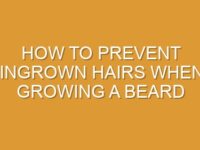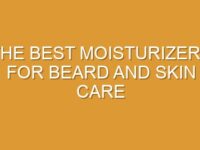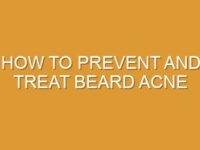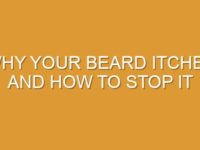-
Table of Contents
Understanding the Causes of Beard Thinning and Hair Loss
Are you experiencing beard thinning or hair loss? Don’t worry, you’re not alone. Many men face this issue at some point in their lives. Understanding the causes of beard thinning and hair loss is the first step towards finding the best ways to deal with it.
One of the most common causes of beard thinning and hair loss is genetics. If your father or grandfather experienced similar issues, there’s a good chance that you will too. This is known as male pattern baldness, and it’s caused by a combination of genetic and hormonal factors. Unfortunately, there’s not much you can do to prevent it, but there are ways to slow down the process.
Another cause of beard thinning and hair loss is hormonal imbalances. Hormones play a crucial role in hair growth, and any disruption in their levels can lead to hair loss. Conditions such as thyroid disorders or an overproduction of dihydrotestosterone (DHT) can contribute to beard thinning and hair loss. If you suspect a hormonal imbalance, it’s important to consult with a healthcare professional who can provide the necessary tests and treatments.
Stress is another factor that can contribute to beard thinning and hair loss. When you’re under a lot of stress, your body releases cortisol, a hormone that can disrupt the hair growth cycle. This can lead to hair follicles entering a resting phase, causing hair to fall out. Finding healthy ways to manage stress, such as exercise, meditation, or therapy, can help prevent further hair loss.
Poor nutrition can also play a role in beard thinning and hair loss. Your hair needs essential nutrients, such as vitamins A, C, and E, as well as biotin and zinc, to grow and stay healthy. If your diet lacks these nutrients, it can affect the health of your hair follicles. Incorporating a balanced diet with plenty of fruits, vegetables, lean proteins, and whole grains can help promote hair growth.
Certain medical conditions and medications can also contribute to beard thinning and hair loss. Conditions like alopecia areata, scalp infections, or autoimmune diseases can cause hair loss. Additionally, certain medications, such as those used for cancer treatment or high blood pressure, can have hair loss as a side effect. If you suspect that a medical condition or medication is causing your hair loss, it’s important to consult with a healthcare professional for proper diagnosis and treatment options.
In conclusion, understanding the causes of beard thinning and hair loss is essential in finding the best ways to deal with it. Whether it’s genetics, hormonal imbalances, stress, poor nutrition, or underlying medical conditions, there are steps you can take to slow down the process and promote hair growth. Remember to consult with a healthcare professional for proper diagnosis and personalized treatment options. Don’t let beard thinning or hair loss affect your confidence – take action and reclaim your full, healthy beard.
Effective Natural Remedies for Beard Thinning and Hair Loss
Are you experiencing beard thinning or hair loss? Don’t worry, you’re not alone. Many men face this issue at some point in their lives. While it can be disheartening, there are effective natural remedies that can help you deal with beard thinning and hair loss. In this article, we will explore some of the best ways to tackle this problem and regain your confidence.
One of the most popular natural remedies for beard thinning and hair loss is the use of essential oils. Essential oils such as rosemary, lavender, and peppermint have been found to promote hair growth and improve the overall health of your hair follicles. You can mix a few drops of these oils with a carrier oil like coconut or jojoba oil and massage it into your beard or scalp. This will stimulate blood flow and nourish your hair follicles, promoting healthy hair growth.
Another effective natural remedy is the use of aloe vera. Aloe vera has been used for centuries for its healing properties, and it can also help with beard thinning and hair loss. Apply fresh aloe vera gel directly to your beard or scalp and leave it on for about 30 minutes before rinsing it off. Aloe vera contains enzymes that can repair damaged cells and promote hair growth.
In addition to essential oils and aloe vera, you can also try using onion juice. While it may sound strange, onion juice has been found to be effective in promoting hair growth. Simply blend an onion and strain the juice. Apply the juice to your beard or scalp and leave it on for 15-30 minutes before rinsing it off. Onion juice contains sulfur, which can improve blood circulation and stimulate hair growth.
If you’re looking for a natural remedy that you can easily incorporate into your daily routine, consider taking supplements. Biotin, also known as vitamin B7, is a popular supplement for promoting hair growth. It helps strengthen the hair follicles and improves the overall health of your hair. You can find biotin supplements at your local pharmacy or health food store.
In addition to these natural remedies, it’s important to take care of your overall health to prevent beard thinning and hair loss. Make sure you’re eating a balanced diet that includes plenty of fruits, vegetables, and protein. Avoid excessive stress, as it can contribute to hair loss. Regular exercise can also improve blood circulation and promote hair growth.
While these natural remedies can be effective, it’s important to remember that results may vary. It’s always a good idea to consult with a healthcare professional before trying any new remedies, especially if you have any underlying health conditions.
In conclusion, dealing with beard thinning or hair loss can be challenging, but there are effective natural remedies that can help. Essential oils, aloe vera, onion juice, and supplements like biotin can all promote hair growth and improve the health of your hair follicles. Remember to take care of your overall health and consult with a healthcare professional for personalized advice. With patience and consistency, you can regain your confidence and enjoy a fuller, healthier beard or head of hair.
Proven Medical Treatments for Beard Thinning and Hair Loss
Are you experiencing beard thinning or hair loss? Don’t worry, you’re not alone. Many men face this issue at some point in their lives. The good news is that there are proven medical treatments available to help you deal with this problem. In this article, we will discuss some of the best ways to address beard thinning or hair loss.
One of the most effective medical treatments for beard thinning or hair loss is minoxidil. This over-the-counter medication is available in both foam and liquid forms. It works by stimulating hair growth and increasing the size of hair follicles. Minoxidil is easy to use and can be applied directly to the affected area. It is important to note that results may vary, and it may take several months of consistent use to see significant improvement.
Another medical treatment option is finasteride. This prescription medication is taken orally and works by blocking the hormone responsible for hair loss. Finasteride has been shown to be effective in preventing further hair loss and promoting hair regrowth. However, it is important to consult with a healthcare professional before starting this treatment, as it may have side effects.
Platelet-rich plasma (PRP) therapy is another medical treatment that has gained popularity in recent years. This procedure involves drawing a small amount of blood from the patient, processing it to separate the platelets, and then injecting the platelet-rich plasma into the scalp or beard area. The growth factors in the platelets help stimulate hair growth and improve the thickness of existing hair. PRP therapy is a safe and minimally invasive procedure, but multiple sessions may be required for optimal results.
For those who prefer a more permanent solution, hair transplant surgery is an option to consider. This procedure involves removing hair follicles from one part of the body, typically the back of the scalp, and transplanting them to the beard area. Hair transplant surgery can provide natural-looking results and is a long-term solution for beard thinning or hair loss. However, it is a surgical procedure that requires careful consideration and consultation with a qualified surgeon.
In addition to these medical treatments, there are also lifestyle changes that can help improve the health of your hair and beard. Eating a balanced diet rich in vitamins and minerals, such as iron and biotin, can promote hair growth. Avoiding excessive heat styling and harsh chemicals can also prevent further damage to your hair. Additionally, managing stress levels and getting enough sleep can contribute to overall hair health.
It is important to remember that everyone’s experience with beard thinning or hair loss is unique, and what works for one person may not work for another. It is always recommended to consult with a healthcare professional or a dermatologist to determine the best course of action for your specific situation.
In conclusion, dealing with beard thinning or hair loss can be challenging, but there are proven medical treatments available to help. Minoxidil, finasteride, PRP therapy, and hair transplant surgery are all effective options to consider. Additionally, making lifestyle changes and taking care of your overall health can contribute to the health of your hair and beard. Remember, it’s important to consult with a healthcare professional to determine the best treatment plan for you. Don’t let beard thinning or hair loss hold you back – take action and regain your confidence!





















